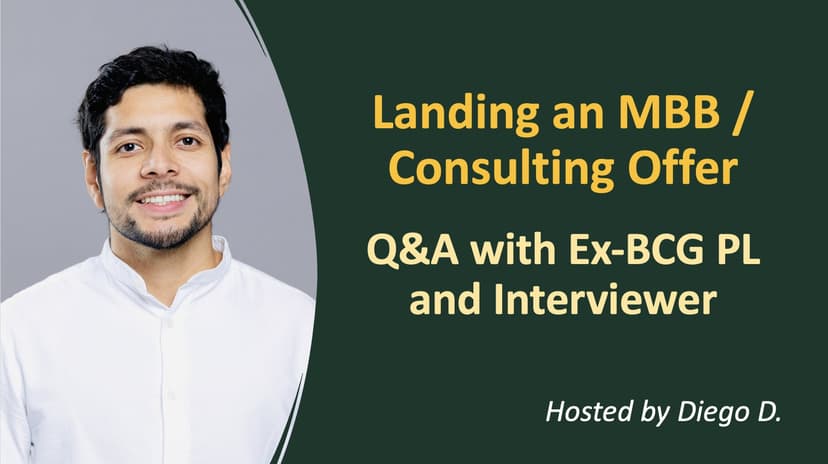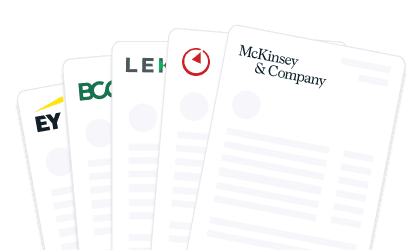Consulting Case Interview Guide – With Examples (2026)
Master the case interview with expert strategies, real examples, and frameworks used by top candidates to land offers at McKinsey, BCG, and Bain.

By Tracy V.
McKinsey l Wharton
Posted February 5, 2026

Join a free event
Learn from top coaches and industry experts in live, interactive sessions you can join for free.
Table of Contents
Written by a former McKinsey consultant and Wharton MBA, this is your ultimate, expert-backed guide to cracking the case interview. Whether you're applying to MBB firms like McKinsey, BCG (Boston Consulting Group), or boutique consulting firms, this article will give you a deeper understanding of what to expect and how to master it.
Your guide is Tracy V., a top-rated coach on Leland who has helped hundreds of candidates land offers at McKinsey, Bain, and BCG. With firsthand experience as a McKinsey consultant and Wharton MBA, she brings sharp insight, empathy, and no-BS advice to every step of the consulting prep journey.
This article covers the full interview process, from case interview preparation and frameworks to problem-solving skills, mental math, communication, and final recommendations. You'll get practice cases, interview questions, and case interview tips used by top candidates to land offers at the most competitive firms.
What is a Case Interview?
A case interview is a type of business case assessment where you're asked to analyze a real-world client problem, usually faced by a consulting firm. It's designed to test your:
- Problem-solving and analytical thinking
- Structured thinking and logical thought process
- Communication skills under pressure
- Ability to solve complex problems in client-facing roles
During a case, you may be asked to perform calculations, interpret data exhibits, answer estimation questions, brainstorm strategies, and deliver a final recommendation. Think of it as a simulation of what consultants do on the job.
Types of case interviews:
- Profitability - Diagnose why a company’s profits are declining
- Growth - Recommend ways to expand revenue or market share
- Market Entry - Assess whether a company should enter a new market
- M&A - Evaluate whether an acquisition makes sense
- Competitive Response - Develop a strategy to respond to a rival's move
- Non-traditional - Non-profit, sustainability, or environmental impact cases
Case Interview Process: What Top Firms Actually Look For
| Step | What Happens | What Interviewers Are Evaluating | Expert-Level Tips | How to Practice Effectively |
|---|---|---|---|---|
| 1. Setup (2–3 minutes) | The interviewer reads the case prompt aloud while you take notes. Afterward, you summarize the problem back to the interviewer and ask 2–3 clarifying questions. | Your ability to actively listen, extract relevant information, identify the client’s core objective, and start strong with confidence. | When recapping, begin with the client’s goal, not just facts. Use the client’s name and clarify any unclear metrics, timeframes, or business model elements. Avoid asking overly technical questions; stay high-level and strategic. | Have a friend or coach read you 10+ real case prompts. Practice summarizing in under a minute and asking only high-value clarifying questions. Log common question types (e.g., business model, scope, timeline) to reinforce your pattern recognition. |
| 2. Framework (4–5 minutes) | You ask for time to structure your approach (2 minutes), then present a logical, MECE framework to explore the case. You’ll guide the conversation from here by identifying what data you want next. | Logical structuring, depth of business understanding, and ability to tailor frameworks to different case types. Also testing poise, clarity, and presence under time pressure. | Avoid using the word “framework” when requesting time; say you’d like to “gather your thoughts.” Build 3–5 buckets, each with 2–3 relevant sub-issues. Use case-specific examples and avoid overlapping categories. After presenting, state a hypothesis and ask for data to explore the most pressing bucket. | Time yourself building case-specific structures in <2 minutes. Record your presentations to check for filler, redundancy, or generic phrasing. Track which buckets you overuse and rotate in others (e.g., competitive landscape, customer acquisition, operational constraints). Use mock interviews to simulate pressure. |
| 3. Interview Questions (10–20 minutes) | The interviewer will lead or let you lead through different case components: brainstorming ideas, analyzing exhibits, doing math, and interpreting business insights. There is no fixed order. | Can you apply structured thinking to ambiguous problems? Do you communicate clearly under pressure? Are you hypothesis-driven and moving the case forward logically? | For brainstorming: use 2–3 MECE categories, preview before diving in, and tie every idea back to the client’s objective. For exhibits: describe the chart clearly, pull out trends, state what it means for the client, and ask what to do next. For math: confirm the question, write out your logic, ask for missing data, and narrate your steps cleanly. Always explain the business “so what.” | Practice full-length cases with a partner who can vary question types and pace. Focus on transitions between segments (e.g., from math to brainstorming) and how well you stay hypothesis-driven. Use real exhibits from BCG or Bain sample cases and talk through insights aloud. Build a running list of creative ideas by industry and case type. |
| 4. Synthesis & Recommendation (2–3 minutes) | You summarize your findings, deliver a clear recommendation, support it with 2–3 data-driven reasons, and mention key risks and next steps. | Executive communication, decision-making under ambiguity, and your ability to prioritize what matters most. This is often where interviewers decide whether they’d staff you on a real team. | Lead with your recommendation, don’t build up to it. Then give 2–3 concise facts from the case that support your stance. Close by highlighting a top risk (e.g., competitor response, implementation challenges) and one specific next step (e.g., pilot test, due diligence). Don’t ramble. Be confident, polished, and client-ready. | Record yourself doing 2-minute recaps after mock cases. Practice trimming your summaries to the essentials without losing clarity. Track how often your recommendations match your earlier hypothesis. Develop a “cheat sheet” of common risks and next steps by case type. |
Case Interview Preparation Strategy
Top consulting firms aren’t just looking for smart candidates; they’re looking for structured, coachable thinkers who can solve real business problems under pressure. The best case interview prep builds the right skills, uses the right resources, and follows a focused, intentional timeline. Here's how to prepare like a future MBB consultant.
Build the Right Skills
To succeed in case interviews, you need to demonstrate more than raw intelligence. You must show that you can solve problems in a hypothesis-driven, structured manner, even when the information is incomplete. Interviewers will watch how you frame problems, break them down logically, and assess tradeoffs in real time. They want to see if you can use quantitative data to support your thinking without losing sight of the bigger picture.
Clear, confident communication is just as important as your analytical ability. You’ll be expected to explain your reasoning concisely, navigate ambiguity, and respond well to curveball questions, all within the fast-moving pace of a live business discussion. Creativity also matters. While logic is essential, top candidates think beyond the obvious and bring original ideas that are tailored to the client and context.

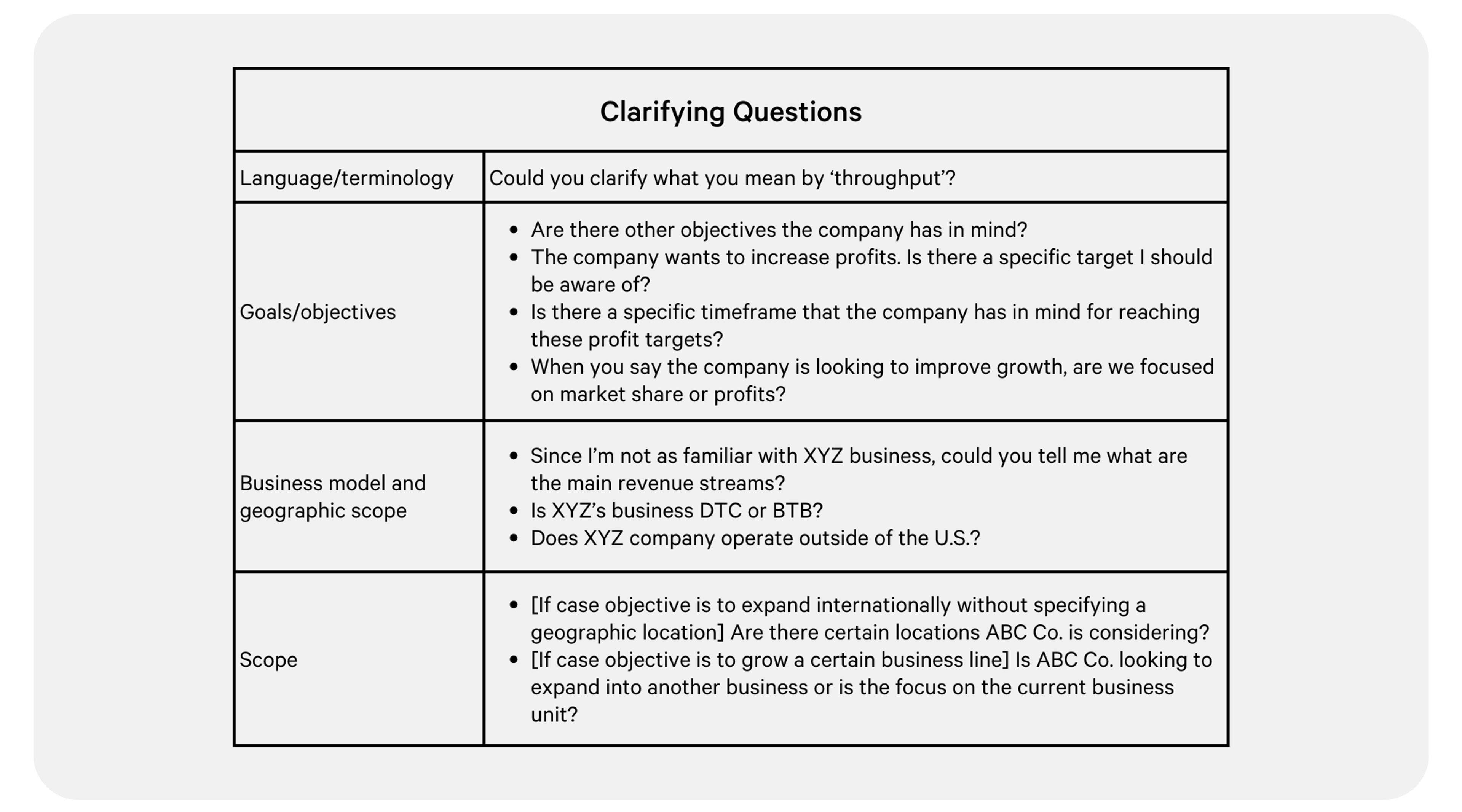
Use the Right Resources
Strong candidates work through full cases from beginning to end. They know that only full-length reps reveal the pacing, mental endurance, and judgment required in a real interview. Great prep also includes getting high-quality feedback. Practicing with peers is helpful, but you need someone who knows what MBB interviewers actually listen for in structure, math, and synthesis.
Top candidates regularly study expert case breakdowns, rewatch their own mock interviews, and analyze where their structure broke down or their math was unclear. They also build a flexible mental library of frameworks and brainstorming buckets, not to memorize them, but to adapt and tailor them based on the case prompt. If you’re preparing for firms like McKinsey, BCG, or Bain, you should also review interviewer-led vs. interviewee-led formats and practice accordingly.
Speed matters too. You’ll often need to complete mental math or interpret exhibits on the spot. Timed drills and case-specific problem-solving tests are critical for building the reflexes and confidence needed to perform under pressure.
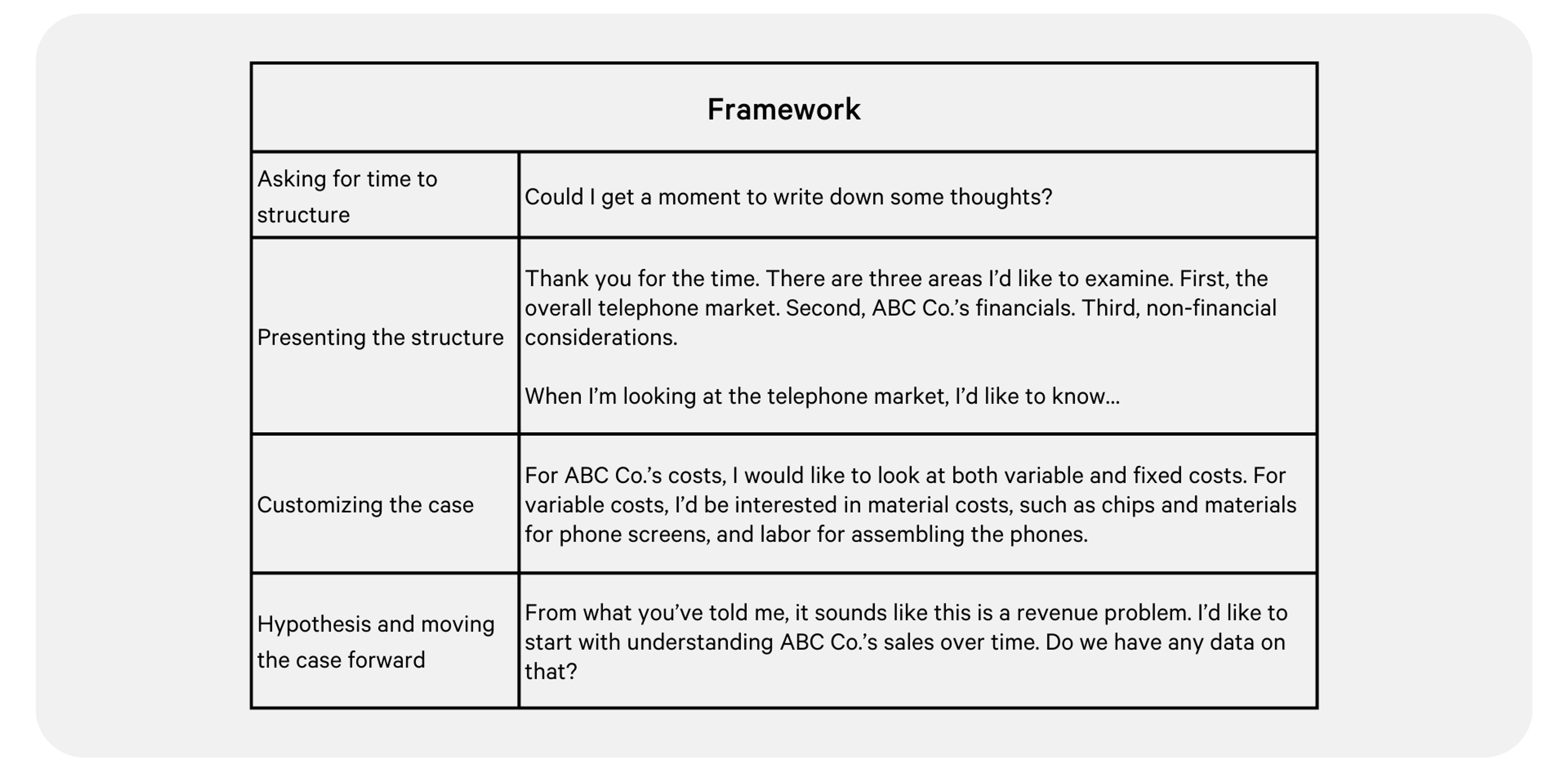
Read: Case Interview Frameworks & When to Use Them
Manage Your Time and Energy
Case prep is a sprint, not a marathon, and how you manage your energy will make or break your performance. Start with a clear plan: map out your interview timeline and create a weekly prep schedule that includes a mix of learning, drilling, and full-case practice. Your schedule should reflect your starting key points, availability, and target firms. If you're preparing while working or in school, be realistic about your bandwidth and prioritize consistency over intensity.
Mock interviews should be built into your plan early and often. Feedback loops are essential for progress. Don’t wait until you feel “ready” to start; get reps in front of another person as soon as possible, even if it’s rough. You’ll build resilience, self-awareness, and adaptability much faster with live practice.
Finally, don’t underestimate the basics. Sleep, rest, and mental sharpness play a huge role in your ability to think clearly. Burnout is common during prep season, and it can tank your performance on interview day. Treat your prep like an athlete would: train with discipline, but protect your ability to perform.
Get Coaching-Level Feedback
Many candidates plateau because they’re practicing alone or getting feedback that’s too vague to act on. A great coach doesn’t just tell you what went wrong; they show you exactly how to fix it, and where to focus next. Whether you’re struggling with math, brainstorming, or synthesis, personalized feedback will fast-track your prep and dramatically increase your odds of success.
Book a free intro call with me to start building your custom prep plan, get expert feedback, and move beyond solo practice.
How to Practice for Case Interviews Like a Future Consultant
Practicing for case interviews isn’t about cramming. It’s about developing professional-grade thinking and communication skills under time pressure, ambiguity, and scrutiny. That’s why the best prep doesn’t just mimic a test. It simulates the job.
Here’s how top candidates approach practice methodically, strategically, and with the end goal in mind: performing like a consultant.
Start With Real, Firm-Specific Sample Cases
Use actual case examples from McKinsey, Bain, and BCG. Each firm has a distinct style: McKinsey is interviewer-led, while Bain and BCG often use interviewee-led formats. Practicing across formats ensures you're comfortable switching between being guided and leading the case yourself.
Don’t rely on generic prompts from random casebooks. Instead, use curated, firm-aligned cases that reflect what real interviewers are asking in 2025. Your goal isn’t to memorize cases; it’s to recognize patterns and learn how to break down unfamiliar problems using the same toolkit.
Read: 50+ Case Interview Questions & Examples (MBB + Other Top Firms)
Treat Mock Interviews Like Real Ones
Schedule live mock interviews regularly, ideally with coaches or peers who are trained to give feedback. Don’t wait until you “feel ready.” Start doing mocks early and often, even if it’s uncomfortable.
Treat every mock like the real thing. Wear interview attire. Set a timer. Record yourself. The goal is to simulate the performance environment as closely as possible. You’ll build real-time judgment, confidence under pressure, and executive presence—all critical for final-round success.
After each mock, debrief in detail. What went well? Where did you lose structure? Were your math steps clear? Did you actually answer the question asked? Great mock sessions aren’t just practice; they’re performance diagnostics.
Watch: Bain Case Interview With Ex-Bain Interviewers (With Feedback & Exhibits)
Analyze Your Mistakes Like a Consultant Would
Most candidates make the same mistakes over and over because they aren’t reviewing their practice with enough rigor. Track your errors, not just the outcome, but the root cause. Have you misinterpreted the prompt? Forgot to state a hypothesis? Missed a calculation because you rushed the setup?
Build a feedback log where you document what went wrong, why it happened, and what you’ll do differently next time. Think of it as your personal case interview error database. Over time, this becomes one of your most valuable prep tools.
Drill the Core Skills in Isolation
Full cases are essential, but targeted drills sharpen the individual muscles. Spend time on each of the four core competencies:
- Structuring: Practice building frameworks from scratch for different case types such as growth, M&A, market entry, and profitability. Time yourself and focus on clarity, not just content.
- Brainstorming: Challenge yourself to come up with creative, MECE solutions for open-ended prompts. Organize your ideas logically, preview your structure, and tailor examples to the industry.
- Math: Run mental math drills, practice multi-step calculations, and focus on articulating your logic clearly. Being accurate is good, but being structured and communicative while calculating is what actually gets you points.
- Synthesis: After every case or drill, summarize your recommendation out loud in under two minutes. Focus on leading with your answer, backing it up with evidence, and outlining risks and next steps like a consultant would with a client.
Think, Speak, and Act Like a Consultant
The best candidates don’t treat case prep like studying for an exam. They use it to build the habits of real consultants: structured thinking, clear communication, data-backed decisions, and poise under pressure.
Every time you practice, ask yourself: Am I thinking like a consultant? Am I speaking like someone who could own a client conversation? Am I acting like someone a team would trust in the room with a partner or CEO?
That mindset, more than any specific framework, is what separates good candidates from great ones.
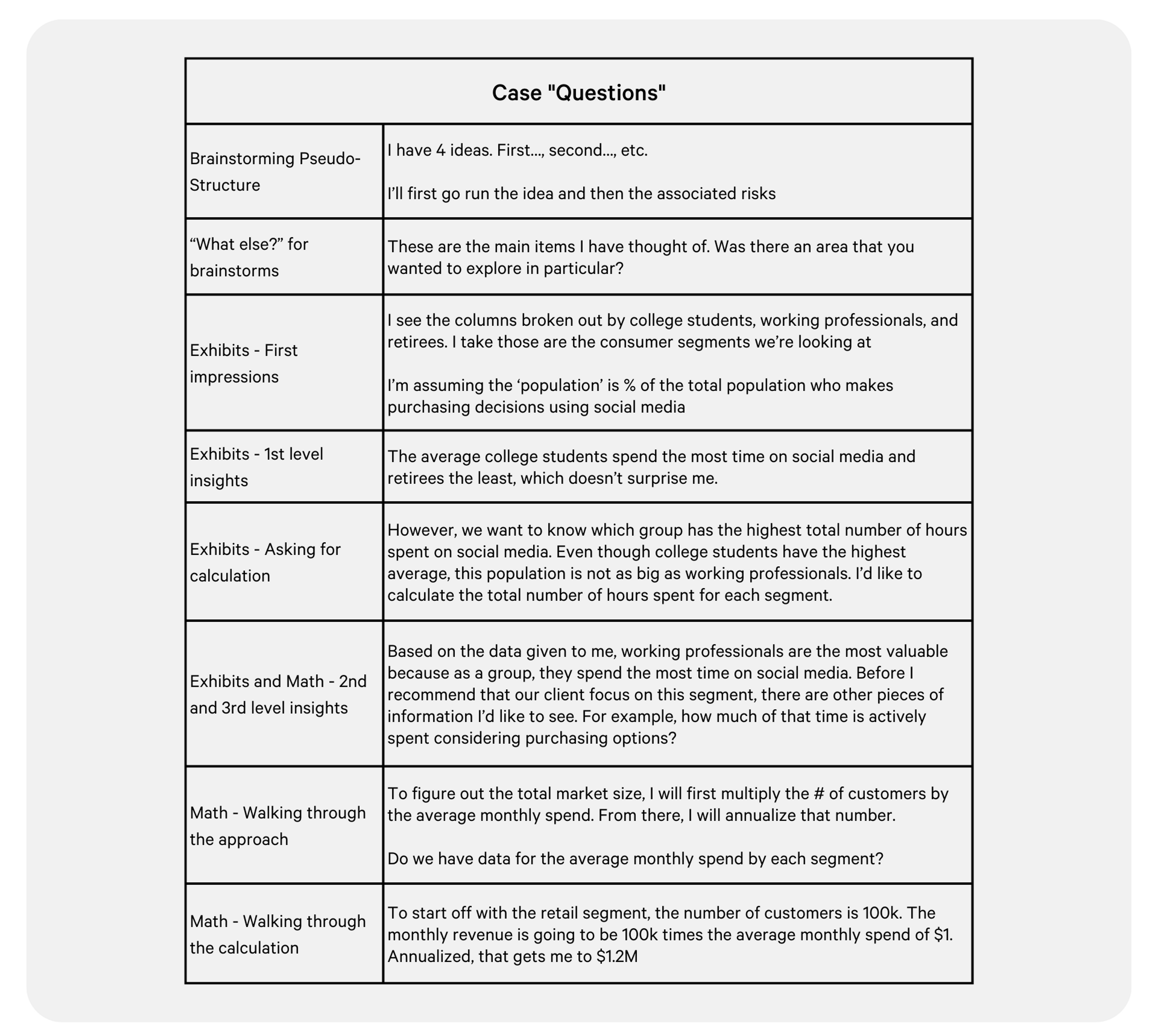
Case Interview Examples: Real Prompts, Real Strategies
| Case Type | Example Prompt | What to Analyze | What Top Candidates Do |
|---|---|---|---|
| Profitability | A global hotel chain has seen its profits decline by 20% year-over-year. The CEO wants to understand what’s causing the drop and how to reverse it. | Decompose the profit equation: revenue (price × volume) and costs (fixed vs variable). Look into room occupancy rates, pricing strategy, customer mix, labor costs, and seasonal trends. | Quickly break the problem into revenue and cost drivers. Use a structured, MECE approach to isolate the issue. Propose short-term fixes and long-term strategies, like dynamic pricing or loyalty programs. Prioritize solutions by impact and ease of implementation. |
| Growth Strategy | A coffee subscription startup wants to double its revenue in the next 12 months. What strategies would you explore? | Explore levers such as customer acquisition, retention, pricing, market expansion, upselling, and partnerships. Consider operational constraints and budget. | Build a flexible structure around internal and external growth levers. Bring in creative ideas like influencer partnerships or bundling. Estimate the revenue potential of each lever. Tie every strategy back to the client’s core capabilities and goals. |
| Market Entry | A European ride-sharing company is considering entering the Southeast Asian market. Should they do it, and how? | Analyze market size, competitive landscape, customer demand, regulatory hurdles, local preferences, and operational costs. Assess whether the company has the capabilities to succeed. | Start by evaluating market attractiveness and strategic fit. Recommend an entry mode (e.g. joint venture, acquisition, organic). Anticipate risks like regulatory pushback. Customize the framework using case-specific geography and customer behavior. |
| M&A / Due Diligence | A private equity firm is considering acquiring a chain of outpatient clinics. Should they proceed with the investment? | Evaluate the target’s financials, growth potential, operational efficiency, market position, and strategic synergies. Identify red flags and valuation concerns. | Build a structure that covers commercial due diligence, operational fit, and financial return. Use investment decision logic (e.g., IRR, payback period). Mention deal risks (e.g., declining market, overestimated synergies) and recommend a clear go/no-go decision with rationale. |
| Competitive Response | A major airline has just learned that a competitor is launching an ultra-low-cost subsidiary. How should they respond? | Assess the threat’s impact on pricing, market share, and brand positioning. Explore options: match pricing, create a low-cost brand, differentiate on service, or shift segments. | Frame the strategic options clearly. Evaluate each one using feasibility, brand impact, and profitability. Justify the recommendation based on long-term brand strategy, not just short-term market defense. |
| Non-Traditional / Public Sector / NGO | A global nonprofit is struggling to attract young donors. How can they improve engagement? | Understand donor behavior, marketing channels, emotional drivers, the UX of the donation process, and partnerships. Define success metrics beyond revenue (e.g., engagement, retention). | Adapt frameworks to the nonprofit setting. Recommend strategies like storytelling, mobile-first donation pages, influencer campaigns, or cause-driven events. Acknowledge that success may be measured in engagement or reach, not just ROI. |
Additional Consulting Case Interview Tips
Check out these consulting interview tips from former McKinsey and Bain interviewers. Then check out these hundreds of free, live consulting workshops and panels.
Final Thoughts
- Your approach is more important than the solution – The interviewer is trying to understand how you think. Some cases have data that support recommendations in either direction. The key piece is that you are able to back your stance using the facts and data uncovered during the interview.
- Dead-ends are okay – There will be times when you make multiple requests for data, and the interviewer does not have it. That’s perfectly fine! You can’t read the interviewer’s mind, and the case could go in so many directions. Just look back at your framework to see where else you can proceed.
- Be coachable – It’s not the end of the world if your method is wrong or if you misinterpret an exhibit. The interviewer wants to see that you are actively listening and can take feedback and improve. Don’t freak out! Stay calm! Listen to what the interviewer is trying to tell you.
This guide only scratches the surface of case interviews. The best way to prepare for case interviews is to get your reps in with entire cases. That way, you can identify your areas of weakness and be more precise with the drills. I can give you feedback and additional tips and tricks so that you are performing at your best on interview day. Book a free intro call with me on my Leland profile to discuss how we can personalize your case prep plan!
Preparing for consulting, recruiting, and/or case interviews? Here are some additional resources to help:
- The 10 Best Consulting Coaches for Case Interviews & Resumes
- Top 5 Tips on Breaking Into Consulting (From an Ex-Bain Interviewer)
- Consulting Resume Guide: Templates, Examples, and What MBB Looks For
- Paths Into Consulting: Target, Non-Target, & Experienced Hire (Post-Grad)
- What is Management Consulting?
- Consulting Deadlines: Complete Timeline for MBB + Top Firms
FAQs
What is a case interview in consulting?
- A case interview is a problem-solving exercise used by consulting firms to evaluate a candidate’s analytical thinking, business judgment, and communication skills through real-world business scenarios.
Are consulting case interviews hard?
- Yes, they’re challenging because they test structured thinking, mental math, and strategic insight under pressure, but strong preparation and practice can significantly improve performance.
How to prepare for a McKinsey case interview?
- Focus on McKinsey’s interviewer-led format, practice structuring problems out loud, improve your math speed, and review sample cases from McKinsey-specific prep resources.
What is the pass rate for McKinsey case interview?
- The pass rate is low, estimated at less than 10%, due to McKinsey’s highly selective process that evaluates both case performance and personal fit.
Where can I find sample cases?
- Many consulting firms publish sample cases online, and Leland offers hundreds more through our coaches and live sessions.

Written by Tracy
5.0
(2)
I am an incoming McKinsey Associate and on break before my start date! I studied anthropology at Stanford before joining J.P. Morgan Private Bank as an investment specialist. After 6 years there, I went to Wharton for my MBA to pivot into a consulting career. Coming from a first-generation, low-income background, I needed to hustle to understand the admissions process. I'm excited to share my process with you and help you think of a game plan and craft an application that truly reflects you. I also very much enjoyed the consulting recruiting process (I used to do case interviews to procrastinate school work). I had spent hundreds of hours researching each firm, networking, and casing before landing a summer internship at McKinsey. Afterwards, I was a Consulting Career Fellows through the Career Management Center and a Case Parent for Wharton's Consulting Club. During that time, I coached and advised 50+ students, with many receiving MBB offers, and would love to help you navigate the recruiting process too. As a former academic tutor during my undergraduate years, I feel strongly about teaching and understand that each person requires customization to fit their needs. I look forward to working with you. I offer 2 primary services: 1. McKinsey/MBB specialist offering, including case interview prep (coached 20+ students to MBB offers), behavioral interview prep, resume review, and networking advice 2. MBA admissions process - I can help you with your game plan, resume, essay, LOR strategy, and interview prep
Tracy has helped clients get into organizations like:
Browse hundreds of expert coaches
Leland coaches have helped thousands of people achieve their goals. A dedicated mentor can make all the difference.




